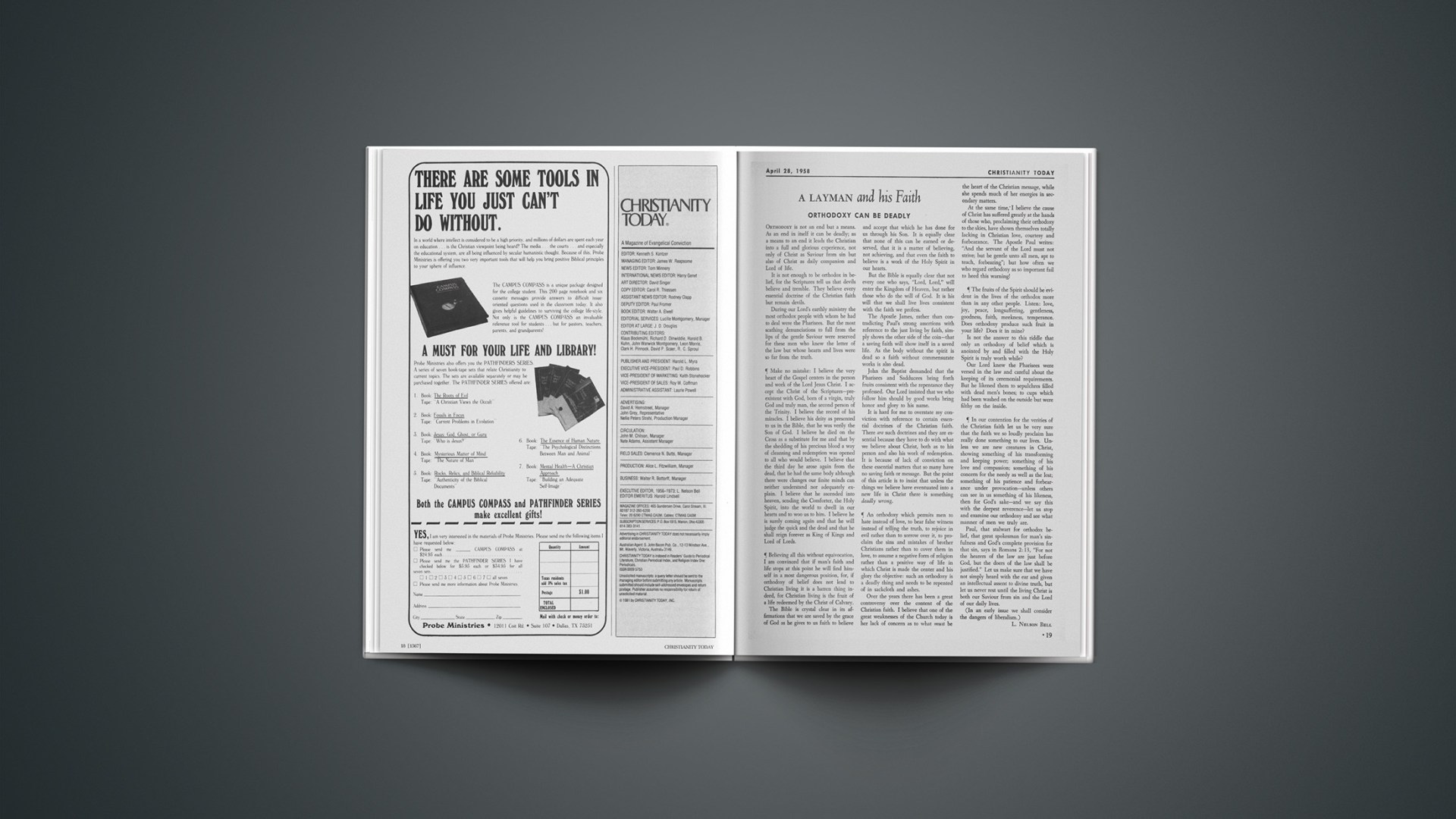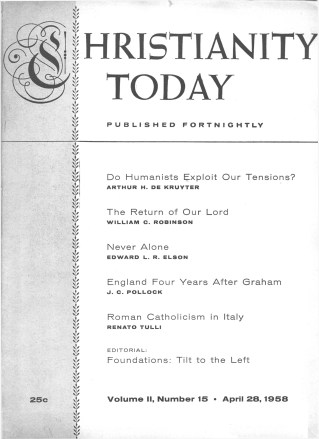Orthodoxy is not an end but a means. As an end in itself it can be deadly; as a means to an end it leads the Christian into a full and glorious experience, not only of Christ as Saviour from sin but also of Christ as daily companion and Lord of life.
It is not enough to be orthodox in belief, for the Scriptures tell us that devils believe and tremble. They believe every essential doctrine of the Christian faith but remain devils.
During our Lord’s earthly ministry the most orthodox people with whom he had to deal were the Pharisees. But the most scathing denunciations to fall from the lips of the gentle Saviour were reserved for these men who knew the letter of the law but whose hearts and lives were so far from the truth.
Make no mistake: I believe the very heart of the Gospel centers in the person and work of the Lord Jesus Christ. I accept the Christ of the Scriptures—pre-existent with God, born of a virgin, truly God and truly man, the second person of the Trinity. I believe the record of his miracles. I believe his deity as presented to us in the Bible, that he was verily the Son of God. I believe he died on the Cross as a substitute for me and that by the shedding of his precious blood a way of cleansing and redemption was opened to all who would believe. I believe that the third day he arose again from the dead, that he had the same body although there were changes our finite minds can neither understand nor adequately explain. I believe that he ascended into heaven, sending the Comforter, the Holy Spirit, into the world to dwell in our hearts and to woo us to him. I believe he is surely coming again and that he will judge the quick and the dead and that he shall reign forever as King of Kings and Lord of Lords.
Believing all this without equivocation, I am convinced that if man’s faith and life stops at this point he will find himself in a most dangerous position, for, if orthodoxy of belief does not lead to Christian living it is a barren thing indeed, for Christian living is the fruit of a life redeemed by the Christ of Calvary.
The Bible is crystal clear in its affirmations that we are saved by the grace of God as he gives to us faith to believe and accept that which he has done for us through his Son. It is equally clear that none of this can be earned or deserved, that it is a matter of believing, not achieving, and that even the faith to believe is a work of the Holy Spirit in our hearts.
But the Bible is equally clear that not every one who says, “Lord, Lord,” will enter the Kingdom of Heaven, but rather those who do the will of God. It is his will that we shall live lives consistent with the faith we profess.
The Apostle James, rather than contradicting Paul’s strong assertions with reference to the just living by faith, simply shows the other side of the coin—that a saving faith will show itself in a saved life. As the body without the spirit is dead so a faith without commensurate works is also dead.
John the Baptist demanded that the Pharisees and Sadducees bring forth fruits consistent with the repentance they professed. Our Lord insisted that we who follow him should by good works bring honor and glory to his name.
It is hard for me to overstate my conviction with reference to certain essential doctrines of the Christian faith. There are such doctrines and they are essential because they have to do with what we believe about Christ, both as to his person and also his work of redemption. It is because of lack of conviction on these essential matters that so many have no saving faith or message. But the point of this article is to insist that unless the things we believe have eventuated into a new life in Christ there is something deadly wrong.
An orthodoxy which permits men to hate instead of love, to bear false witness instead of telling the truth, to rejoice in evil rather than to sorrow over it, to proclaim the sins and mistakes of brother Christians rather than to cover them in love, to assume a negative form of religion rather than a positive way of life in which Christ is made the center and his glory the objective: such an orthodoxy is a deadly thing and needs to be repented of in sackcloth and ashes.
Over the years there has been a great controversy over the content of the Christian faith. I believe that one of the great weaknesses of the Church today is her lack of concern as to what must be the heart of the Christian message, while she spends much of her energies in secondary matters.
At the same time, I believe the cause of Christ has suffered greatly at the hands of those who, proclaiming their orthodoxy to the skies, have shown themselves totally lacking in Christian love, courtesy and forbearance. The Apostle Paul writes: “And the servant of the Lord must not strive; but be gentle unto all men, apt to teach, forbearing”; but how often we who regard orthodoxy as so important fail to heed this warning!
The fruits of the Spirit should be evident in the lives of the orthodox more than in any other people. Listen: love, joy, peace, longsuffering, gentleness, goodness, faith, meekness, temperance. Does orthodoxy produce such fruit in your life? Does it in mine?
Is not the answer to this riddle that only an orthodoxy of belief which is anointed by and filled with the Holy Spirit is truly worth while?
Our Lord knew the Pharisees were versed in the law and careful about the keeping of its ceremonial requirements. But he likened them to sepulchres filled with dead men’s bones; to cups which had been washed on the outside but were filthy on the inside.
In our contention for the verities of the Christian faith let us be very sure that the faith we so loudly proclaim has really done something to our lives. Unless we are new creatures in Christ, showing something of his transforming and keeping power; something of his love and compassion; something of his concern for the needy as well as the lost; something of his patience and forbearance under provocation—unless others can see in us something of his likeness, then for God’s sake—and we say this with the deepest reverence—let us stop and examine our orthodoxy and see what manner of men we truly are.
Paul, that stalwart for orthodox belief, that great spokesman for man’s sinfulness and God’s complete provision for that sin, says in Romans 2:13, “For not the hearers of the law are just before God, but the doers of the law shall be justified.” Let us make sure that we have not simply heard with the ear and given an intellectual assent to divine truth, but let us never rest until the living Christ is both our Saviour from sin and the Lord of our daily lives.
(In an early issue we shall consider the dangers of liberalism.)
L. NELSON BELL










